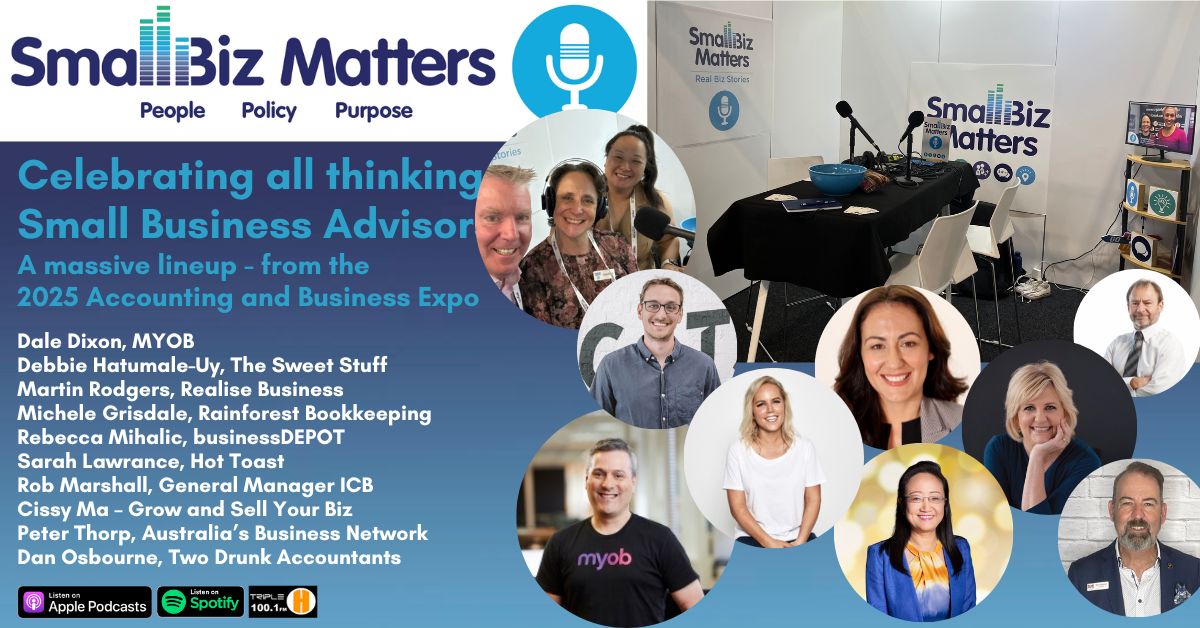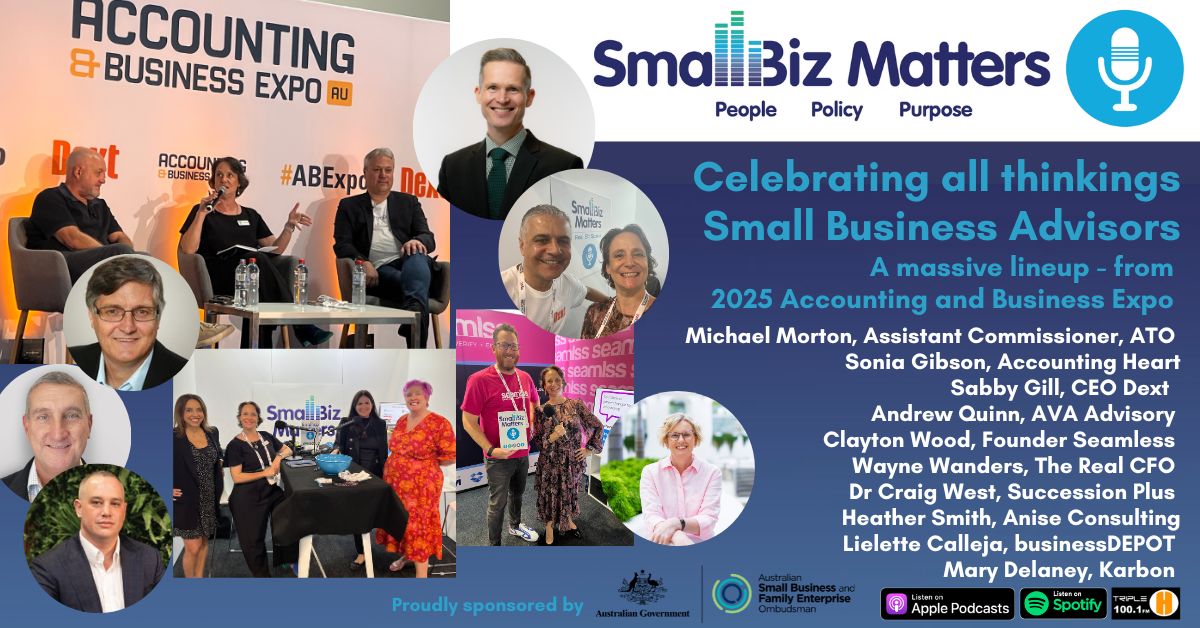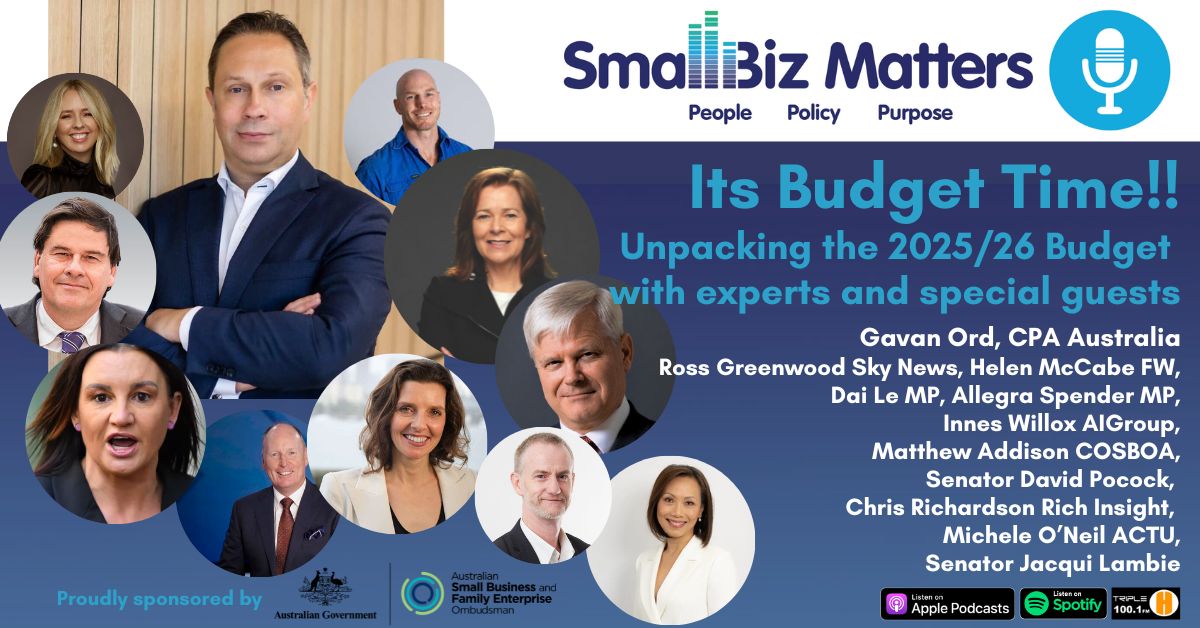The Dark Art of Brand - 14/03/2017
| Tuesday March 14Small Biz Matters – a half hour program each week where you can work ON your business rather than IN it.
with Alexi Boyd from Boyd Office Management Services
Date: 14 March 2017
Branding. It certainly is a dark art. Where to begin? How do you differentiate yourself from the competition in what ALWAYS seems to be a flooded market (no matter what industry you’re in). How to stand out? How to stay relevant, hip, happening… it’s a minefield.
We are the experts in our field but I’ve never met a plumber who tried to brand themselves. It takes knowledge of industry, patience, creativity - many attributes we simply don’t have as small businesses, or worse still, we THINK we do but really don’t.
Welcome to the show Aranka.
Topics we’ll be covering:
- What’s crucial to a good brand?
- Why should you NEVER rush the branding process?
- What is a brand blueprint and why is it important?
- When is the best time to audit your brand?
- What is a Brand Audit process exactly?
- Can these concepts be applied to all industries or just those with “creativity” elements?
--
- What’s crucial to a good brand?
Let’s first understand what is a brand.
It is every touch point that a prospect or client uses to understand your business.
A brand presents the brand story in a logo, words, messages, video, audio, sound, pictures, style, website, email, SEO, product, packaging, signage, car signage, PR, advertising……everything. So it is every engagement that you have with a prospect, all customer experiences including the telephone call you just finished.
Usually you need help from a specialist who knows how to ask the right questions, to tease out from you the things that you don’t see within your business, the things that make your business unique, special, different and the ability to focus on the how you add value to your clients. Then you need to be honest with them and let them create a brand that aligns to your brand story.
Great brands tell great stories. And by stories I don’t mean making it up. I mean knowing it so you are authentic, clear and succinct and visually representing what people are looking for when they look for a product like yours. It has to resonate with people. It is also about people talking about you and being prepared to endorse you.
When there is no story you don’t get noticed.
- Why should you NEVER rush the branding process?
There are so many things to decide:
- what are you offering,
- who is it for,
- how will you be remembered
- can people find you easily
- how are you different
- what is the competition doing
- what do they look like
- is there a gap in the market that this business will serve
- what makes you special, unique, different,
- why you?
- Do people understand the value?
- What is the user experience that you want to create?
- What is your vision, mission, and values?
Creating a brand is much more that bringing together an icon – a shape that will be ‘the mark’ you are know by and your name.
You can buy a logo from lots of places. Did you just buy on off the shelf or was it designed to tell your story? The logo is one part, what about the rest?
How many opportunities to put your brand out there are you missing because these parts have not been thought through?
What I often see is a logo that does not personify the brand, it confuses the target audience and has no meaning. It might be a colour that the business owner likes, but its style is not aligned to the business, or it is not speaking to the target audience at all.
Or worse still, it looks so similar to the competition that when one company spends dollars in marketing effort the competitors sales goes up. And when this happens continuously the business can go broke and the competition flourishes and ends up holding a greater market share. But then how would you know?
You really need to understand what your business is in the eyes of your prospects, existing clients, suppliers and other interested parties like shareholders for example and ultimately those who would want to buy your business.
What is the problem the business is solving, who is likely to want that service, where are they, how do you reach them?
Let us understand that great brands are stories. How well that story is told and how it engages the target audiences is how successful the business could be.
- What is a brand blueprint and why is it important?
When we start to design a brand we must understand the DNA of the organisation. We go through a process that we call the brand blueprint. A brand blueprint is about creating an understanding of what the business wants to become, why it exists, what is its promise, central idea and how will the business positions itself in the market as well as a lot of other drivers that is intended to create the brand.
It usually involves stakeholders and people who are emotionally involved in the brand and business.
- What is a Brand Audit process exactly?
It is a process of investigating what the perception of the brand is today and what clients think are the best and the worst of the brand, who really gets the business and who is likely to not be part of the future direction of business goals and activities. It supports how the brand should be evolved to reach a new audience or strengthen the commitment to the existing clients.
- When is the best time to audit your brand?
The best time of auditing your brand is when you are not reaching a new audience. We have seen a great shift in the way people want to be communicated with and many organisations have not made the change to digital in a way that helps them get more business. Brands should be audited once every 3-5 years to make sure that the audience understands what the business represents, it is refreshed and keeping up with digital changes and tools that help clients find you.
- Can these concepts be applied to all industries or just those with “creativity” elements?
Having solid brand principles and practices applies to all businesses and even those who are interested in the development of their personal brand. This is particularly relevant to smaller firms where the brand is the principal and there is a need for intergenerational transfer of the business and the brand needs to evolve to include a greater number of people that now want to build up the business.
Remember your brand will have long term impact on your business the name/font/style/logo/icons all sell your business
To find out more go to their website: einsteinmarketing.com.au





